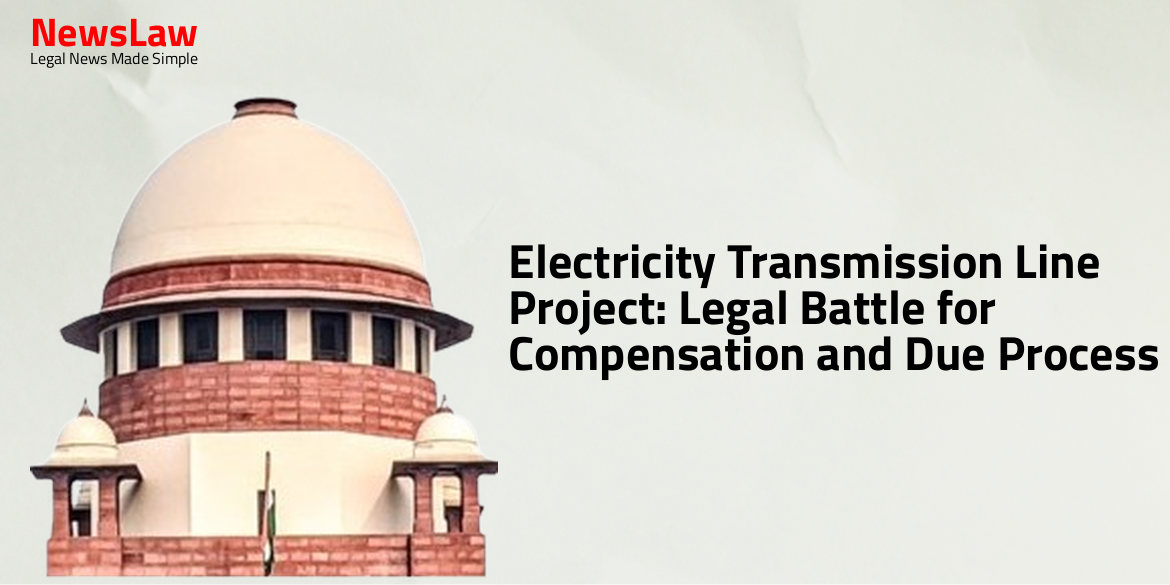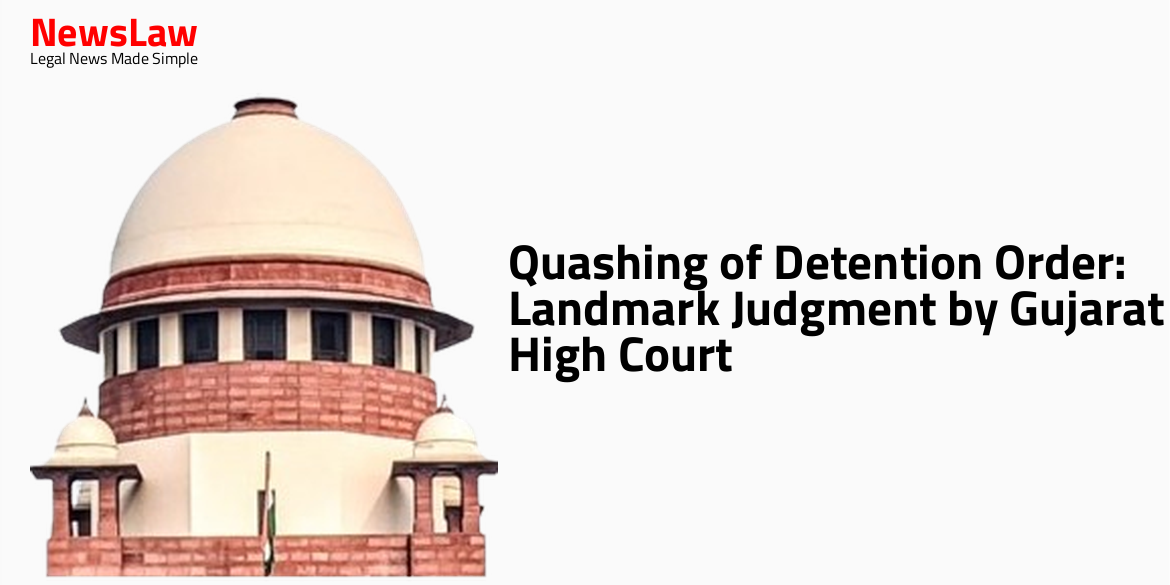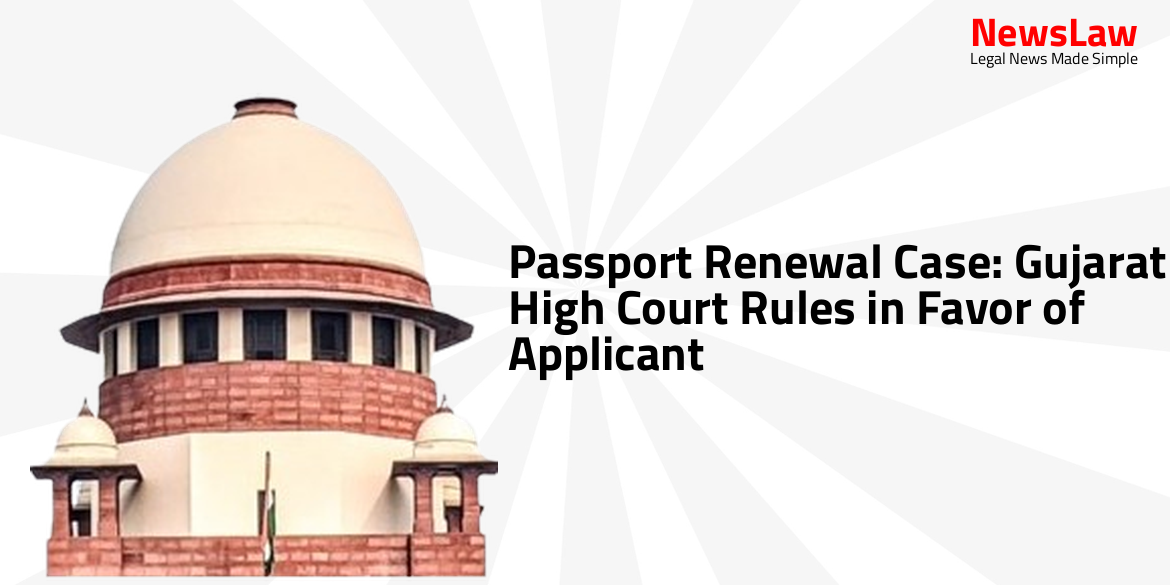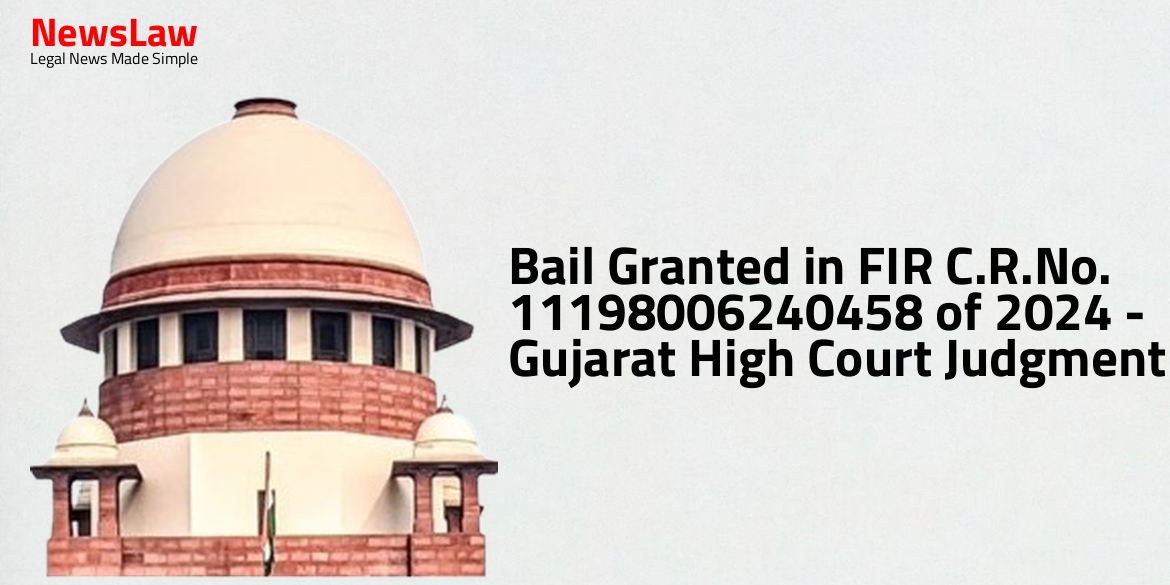In a significant legal battle concerning an electricity transmission line project, the Gujarat High Court delivered a crucial ruling related to compensation and adherence to due process. The case involves disputes over compensation and procedural aspects in the implementation of the project, impacting various stakeholders. Let’s delve into the details of this high-stakes court decision.
Facts
- Farmers’ demands for higher compensation were considered by the District Magistrate.
- District Magistrate granted permission for laying the transmission line after hearing all stakeholders.
- Compensation for loss of land and crops was mandated as per government rules.
- Farmers raised objections to the work being done without prior notice by the company.
- Transmission licensee only has the right of user under ROW and not land acquisition.
- Petitioners did not request copies of applications under Section 16(1) of Telegraph Act.
- Mutation in possession due to resurvey should entail compensation after corrections.
- Petitioners challenged the District Magistrate’s order in the present petition.
- Requested relief includes quashing the order for violating principles of natural justice.
- Challenge also involves the legality of acquisition without due process and public notice.
Arguments
- Petitioners raised objections regarding sufficiency of compensation through multiple letters.
- Petitioners claim they were not granted an opportunity to understand the process of laying down transmission towers.
- Petitioners were not provided a copy of the application filed by the electricity company, which they claim was necessary.
- Petitioners argue that principles of natural justice were not followed by the quasi-judicial authority during the process.
- The District Magistrate issued notices and held hearings to address grievances of affected villagers.
- The electricity company, through its subsidiary, had the authority to lay down transmission lines for a public project.
- The electricity company made efforts to inform and involve villagers in the process, including providing compensation details.
- Villagers were given multiple opportunities for hearings, even though some did not attend.
- The petitioners’ argument of lack of opportunity and breach of natural justice is contested by the AGP, who asserts that proper procedures were followed.
- REC Power Development & Consultancy Ltd. was appointed as the Bid Process Coordinator for laying the Banaskantha – Ahmedabad 765 kV D/c transmission line.
- The Central Electricity Authority issued approval for the Transmission Network Expansion in Gujarat, which included laying the said transmission line.
- The completion date for the project was set for 09/03/2025 with an initial estimated cost of Rs.815.12 crores.
- The petitioners raised objections related to compensation only, not violations of natural justice or due process of law.
- The Ministry of Power issued guidelines for compensation under ROW, which was adopted by the State of Gujarat.
- Alternative remedies are available under the Indian Telegraph Act for sufficiency of compensation.
- The petitioners failed to establish a statutory right to demand a copy of the application filed under the Telegraph Act.
- The petitioners were aware of the transmission line project since June 2023 through public notices and CERC orders.
- The doctrine of Eminent Domain was upheld, emphasizing the public interest over private interests.
- The petition was considered a misuse of the legal process, and the request for dismissal was made to allow the transmission line project to continue.
Analysis
- The execution of works involving erection of towers and connection of overhead lines is done after a detailed field study.
- Public interest in providing electricity is given precedence over private interest.
- The power of the District Magistrate is confined to exercising discretion in granting permission under the Telegraph Act.
- Legal sanction is given to the licensing authority to enter any property to lay poles or draw electric lines under Section 10 of the Indian Telegraph Act.
- Section 164 of the Electricity Act, 2003 authorizes public officers, licensees, or other persons to exercise specific powers.
- No provision for notice or hearing to the public or landowners is present in the legislation.
- In the absence of an order under Section 164, consent of owners or occupiers may be necessary under Section 12(2) of the Indian Electricity Act, 1910.
- The Works of Licensees Rules, 2006 under Section 67(2) govern the field only in the absence of an order under Section 164.
- Hearing of objections from stakeholders and affected parties is essential before passing orders.
- Compensation for damage caused during construction activities is mandatory as per Section 10 of the Indian Telegraph Act, 1885.
- Specialised and technical expertise is considered while deciding on the route for laying electric lines.
- The landowner’s right is only to seek compensation for any damage sustained due to the exercise of powers, not for acquisition of land.
- The action of erecting poles for electric lines is deemed legal under the relevant Acts and authorities have followed due process.
- The District Magistrate may order the telegraph authority to exercise all powers in case of resistance or obstruction.
- Section 164 of the Electricity Act, 2003 along with Section 10 of the Indian Telegraph Act, 1885 allows the respondent Company to lay high tension electric lines on the appellant’s land without the need for acquisition or consent.
- Appellant can claim compensation for any damage caused by the electric lines.
- In the case of Gujarat State Energy Transmission Corporation Limited v/s. Ratilal Maganji Brahmbhatt, it was established that the installation of poles on agricultural land does not require consent under certain rules.
- The District Magistrate has the power to permit the telegraph authority to exercise powers in case of resistance.
- Section 10 of the Indian Telegraph Act, 1885 allows the telegraph authority to place and maintain telegraph lines and posts on any property without the need for acquisition.
- The powers granted by Section 10 do not require notice or consent from the landowner.
- The State Government can confer the powers of the telegraph authority for placing electric lines under Section 164 of the Electricity Act, 2003.
- The powers granted under Section 164 and Section 10 enable the placement of electric lines without acquisition, subject to minimal damage and compensation.
- Sections 16 and 17 of the Indian Telegraph Act, 1885 do not limit the telegraph authority’s absolute powers for placing electrical plant, lines, and structures.
- Objections/resistance under Section 16(1) would render the powers granted by Section 10 and Section 164 meaningless, affecting the provision of electricity as a public utility.
- Interpreting Section 16(1) as requiring prior notice or consent would defeat the purpose of Sections 10 and 164.
- Prior to the enactment of Electricity Act, 2003, consent of the owner or occupier was necessary where there was no authorization under Section 51 of the Indian Electricity Act, 1910.
- The purpose of the Act is to provide electricity to the public at large.
- Objections or resistance under Section 16(1) of the Indian Telegraph Act, 1885 would render Section 10 of the Indian Telegraph Act, 1885 and Section 164 of the Electricity Act, 2003 meaningless.
- When Electricity Board exercises power under Section 164 of the Electricity Act read with Section 10 of the Telegraphs Act, they are not acquiring any land, but making use of the land for laying electric lines with full compensation for any damage caused.
- No notice or consent is required from the owner before laying poles or constructing any tower.
- Detailed public notice is not necessary if there is an order in this regard.
- Objections raised by the petitioners cannot be a ground to stop the laying down of the transmission line.
- Petitioners cannot claim frustration of their rights, especially when they were aware of the dispute.
- Given the undisputed facts and legal position, the Court finds no reason to intervene in the District Magistrate’s order.
- The respondent with the license to lay down the transmission line should proceed as planned to supply electricity to the public.
- The exercise must be completed within the stipulated time, prioritizing public welfare.
Decision
- The respondent Utility Company undertook the acquisition of Easementary and/or User rights without publishing public notice, depriving the petitioners of their right to raise objections.
- The lack of public notice and opportunity for objections constitutes fraud, rendering the order passed by the District Magistrate as non-est, bad in law, illegal, and unconstitutional.
- Section 10(d) of the Indian Telegraph Act, 1885 mandates the respondent to minimize damage and pay compensation, with a recourse to the District Judge in case of insufficient compensation.
Case Title: CHAUDHARI KARSHANBHAI KUBERBHAI Vs. COLLECTOR / DISTRICT MAGISTRATE PATAN
Case Number: R/SCA/3395/2024



